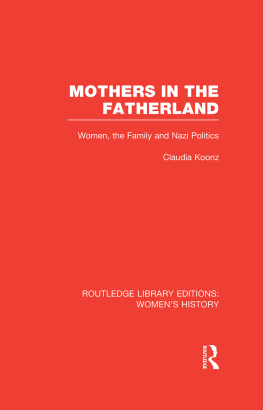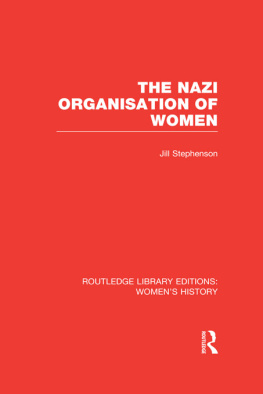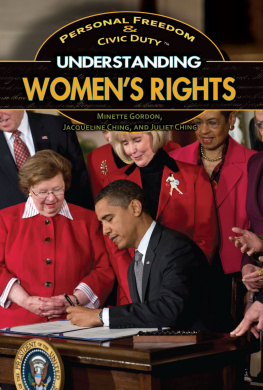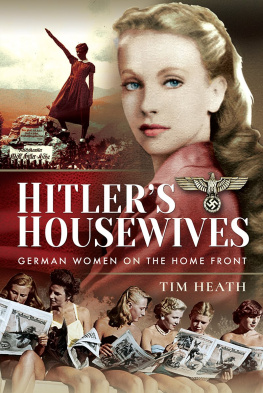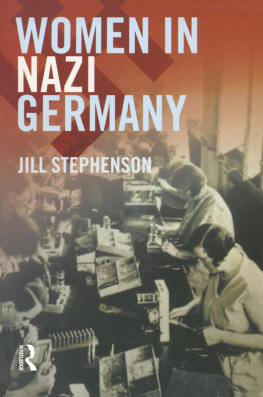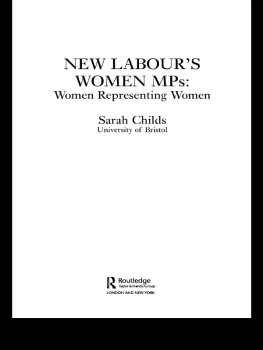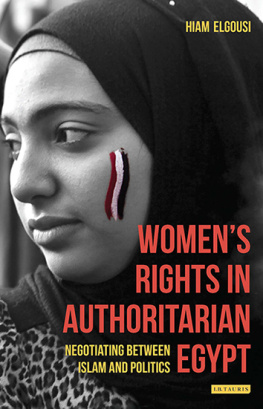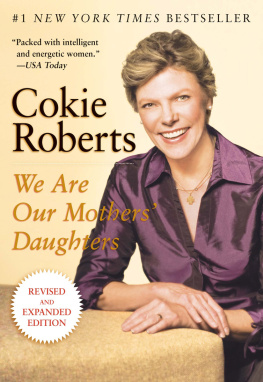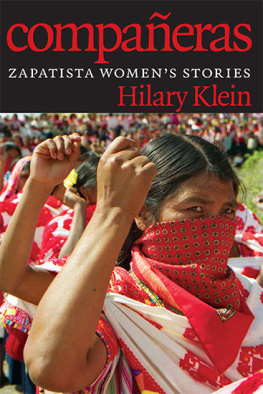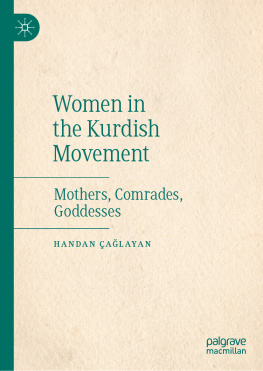Routledge Library Editions: Womens History
MOTHERS IN THE FATHERLAND
Mothers in the Fatherland
Women, the Family and Nazi Politics
Claudia Koonz
Volume 24
First published in 1987
This edition first published in 2013
by Routledge
2 Park Square, Milton Park, Abingdon, Oxon, OX14 4RN
Simultaneously published in the USA and Canada
by Routledge
711 Third Avenue, New York, NY 10017
Routledge is an imprint of the Taylor & Francis Group, an informa business
1986 Claudia Koonz
The right of Claudia Koonz to be identified as Author of this Work has been asserted by her in accordance with the Copyright, Designs and Patents Act 1988.
All rights reserved. No part of this book may be reprinted or reproduced or utilised in any form or by any electronic, mechanical, or other means, now known or hereafter invented, including photocopying and recording, or in any information storage or retrieval system, without permission in writing from the publishers.
Trademark notice : Product or corporate names may be trademarks or registered trademarks, and are used only for identification and explanation without intent to infringe.
British Library Cataloguing in Publication Data
A catalogue record for this book is available from the British Library
ISBN: 978-0-415-53409-3 (Set)
eISBN: 978-0-203-10425-5 (Set)
ISBN: 978-0-415-63272-0 (Volume 24)
eISBN: 978-0-203-09544-7 (Volume 24)
Publishers Note
The publisher has gone to great lengths to ensure the quality of this reprint but points out that some imperfections in the original copies may be apparent.
Disclaimer
The publisher has made every effort to trace copyright holders and would welcome correspondence from those they have been unable to trace.
What is past is not dead; it is not even past. We cut ourselves off from it;
we preferred to be strangers.
Christa Wolf, Model Childhood
For my parents,
Oliver W. and Edna Kingston Koonz
Contents
From the very beginning of my study of women in Nazi Germany, I knew that I would depend upon the close collaboration of archivists, colleagues, and friends. The scarcity of published documents and secondary works in the mid-1970s meant that before even beginning this undertaking I needed the advice of dozens of curators at state, local, church, and organizational archives. From the very first, too, 1 received vital feedback from other historians who shared their specialized knowledge about sources and also forced me to relate information about women to the wider perspectives of the history of inter-war Germany. Gathering information about so dismal a period becomes depressing. The historical figures I admired were nearly always killed and the women Nazis 1 deplored virtually always thrived, even after 1945. Without the friends who helped me think through my responses to the unrelieved tragedy of the Nazi period, I might have succumbed either to a professional callousness that blotted out empathy or despaired completely and abandoned the project altogether.
I have looked forward to writing this acknowledgment as a tribute to the many individuals who helped me out in so many ways. My first thanks go to colleagues who encouraged me to begin my forays into archives from the Nazi period. Renate Bridenthal, Rudolf Binion, Hannah Papaneck, Fritz Ringer, Carl Schorske, and Joan Scott read and commented on my earliest proposals for this research in the mid-1970s. More recently, the late Warren Susman, John Gillis, Peter Gay, Charles S. Meier, and Ismar Schorsch helped me to rethink my conclusions and consider new dimensions of my findings.
Without substantial aid I could never have completed extensive archival research in Germany. Most of all, the College of the Holy Cross has supported me with not only a sabbatical year, but a one-semester Faculty Fellowship, unlimited computer time and a VAX terminal, and generous annual grants to defray expenses for travel, interviewing, and Xeroxing. The German Marshall Foundation and the Rockefeller Foundation each granted me yearlong fellowships to pursue research and writing. The National Endowment for the Humanities awarded me a Travel-to-Collections grant so I could carry on interviews with Jewish Germans living in Germany.
Because the success of this study depended upon my discovering little-known source material, I want to acknowledge my special debt to the dozens of staff members of archives in Germany, France, England, and the United States who gave so generously of their time and shared their immense knowledge of their respective collections. Agnes Peterson early on directed my attention to the valuable autobiographical essays in the Abel Collection at the Hoover Institution for War, Revolution and Peace at Stanford University. I continued my search for individual records at the Berlin Document Center, where Herr Pix and William Simon patiently provided me with files and new "leads." In my search for background information and periodicals, Frau Lorenz at the German Institute for Social Questions in Berlin provided me with hours of thoughtful assistance. In the process, she allowed me access to the papers of Helene Lange Collection. Frau Rasch at the library of the Ver band Weiblicher Angestellte in Berlin allowed me to spend days reading in the organization's extensive periodical collection.
Dr. Rumschttel at the Munich State Archives opened up to me the extraordinary collection of women's papers and memos in the Ministry of Education and National Socialist Teachers' Union (NSLB) files. For material on women in the early part of the century, I am grateful for the guidance of Dr. Cecile Lowenthal-Hess of the Geheimes Staatsarchiv Preussischer Kulturbesitz, Dr. Eberhard Heyl of the Bavarian Haupt-staatsarchiv IV, and Herr Teichmann of the Siemens Archives in Munich. Elke Frlich at the Institute for Contemporary History shared with me her study of police files and gave me valuable guidelines to the Institute collections. Frau Brigitte Emmer helped me out with procedures and catalogues. Blanche Wiesen Cook called my attention to the Robbins papers at the Roosevelt Library.
Dr. Neugebauer shared with me his extensive knowledge of the Federal Military Archive in Freiburg holdings related to women's participation in wartime labor mobilization. Herr Scharmann supplied me with relevant information about the Federal Archives in Koblenz. At the Munich State Archives, Fraulein Booms brought me files and explained procedures. The staff of the North Rhineland Westphalian Gestapo Archives in Dusseldorf supplied me with access to organizational files in their collections. In the Nuremberg State Archives, Frau B. Bauer-schfer guided me through the indices related to local and regional government. Frau Pietrowski introduced me to the Lower Saxony Hauptstaatsarchiv in Pattensen. At the Hessian State Archives Herr Helfer and Frau Dr. Lowenstein explained the holdings and suggested I investigate the extensive Nazi Party membership applications. At the Kalkum branch of the Diisseldorf State Archives, Herr Reuter patiently supplied dozens and dozens of folios on local and regional social history.
Herr Wolfgang Strecker clarified the extraordinarily rich organizational records of Catholic organizations at the Deutscher Caritasverband Archives in Freiburg, and Herr Dr. Hans-Josef Wollasch allowed me access to the social work and educational library at the Caritas Fach-hochschule in Freiburg. In the Archbishopric Archives in Freiburg, Frau Ulrike Dehn spent hours with me pouring through catalogues and files related to women, Archbishop Grober, and local educational organizations. At the office of the League of Catholic Women Teachers in Essen, Frau Dr. Pflug and Frau Emmerich gave unstintingly of their time to share with me their collection of teachers' autobiographies from the Nazi period. Maria Prym and Frau Klopper made me feel at home by not only allowing me to read in their collection at the Catholic Women's League in Cologne, but also by their willingness to discuss their organization s history.

